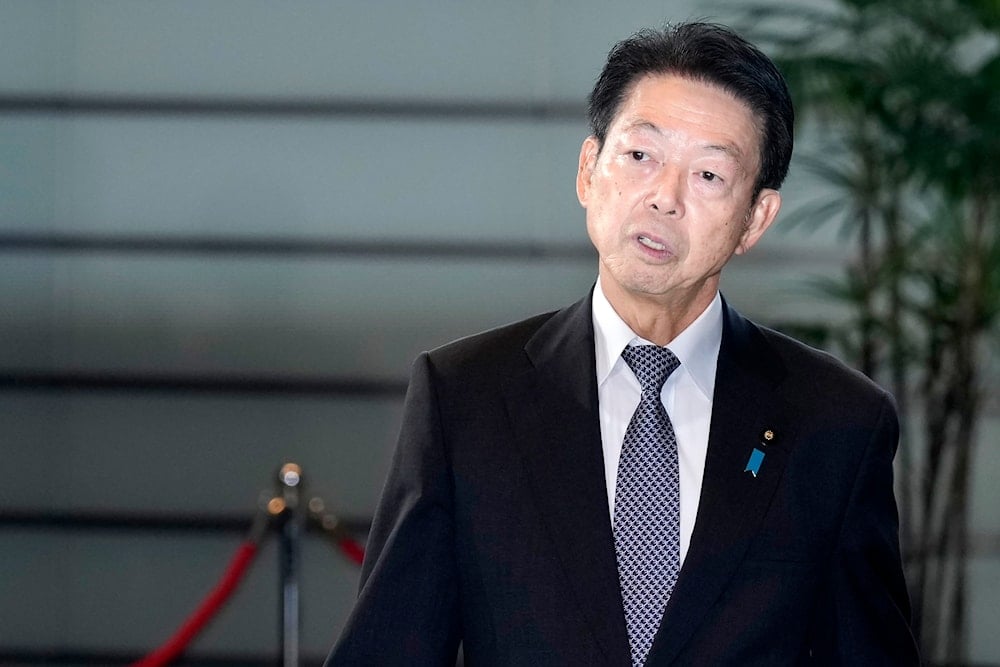Japan says US tariffs 'extremely regrettable', may break WTO rules
Japan expresses serious concerns that the US tariffs could violate WTO regulations and the bilateral trade agreement with the US.
-

Yoji Muto, newly appointed minister of Economy, Trade and Industry, arrives at the prime minister's official residence on October 1, 2024, in Tokyo. (AP)
Japan criticized US President Donald Trump's broad new tariffs on Thursday as "extremely regrettable," warning that they could violate WTO regulations and the bilateral trade agreement.
Despite being among the largest investors in the US, Japanese companies were not granted an exemption, with Trump imposing a substantial 24% tariff on Japanese imports.
"I have conveyed that the unilateral tariff measures taken by the United States are extremely regrettable, and I have again strongly urged (Washington) not to apply them to Japan," Yoji Muto, trade and industry minister, told reporters.
He mentioned that he had a conversation with US Commerce Secretary Howard Lutnick before Trump unveiled a new 10% baseline tariff and additional duties on specific countries, including Japan, a close strategic ally.
"Japan [are] very very tough. Great people.... They would charge us 46 percent, and much higher for certain items," Trump said. "We are charging them 24 percent."
Muto said he had explained to Lutnick "how the US tariffs would adversely affect the US economy by undermining the capacity of Japanese companies to invest." He added, "We had a frank discussion on how to pursue cooperation in the interest of both Japan and the United States that does not rely on tariffs."
Government spokesperson Yoshimasa Hayashi also stated that the US actions could potentially violate World Trade Organization (WTO) regulations and the trade agreement between the two nations. "We have serious concerns as to consistency with the WTO agreement and Japan-US trade agreement," he told reporters.
When asked whether Japan would impose retaliatory tariffs or consider filing a complaint with the WTO, Hayashi said, "We decline to disclose details of our considerations."
It is worth noting that China, South Korea, and Japan agreed on March 30 to bolster free trade efforts amid a wave of new tariffs imposed by Trump.
Abe exception
During Trump's first term, then-Prime Minister Shinzo Abe, who had a close relationship with Trump, successfully obtained an exemption from tariffs.
Trump hosted Prime Minister Shigeru Ishiba for friendly and fruitful talks in February, hailing a "new golden age for US-Japan relations."
Ishiba pledged a trillion dollars in investments and agreed to import what Trump described as "record" amounts of US natural gas.
Trump stated that, alongside South Korea, Japan would collaborate on a "gigantic natural gas pipeline in Alaska." Meanwhile, Japan has also been unable to secure an exemption from the 25% tariffs on its major auto sector’s exports to the United States, which took effect on Thursday.
Last year, vehicles represented roughly 28% of Japan’s total exports to the United States, valued at 21.3 trillion yen ($142 billion), with approximately 8% of all Japanese jobs connected to the automotive sector.
As reported by Bloomberg News, Japanese carmakers ship about 1.45 million vehicles to the US from their factories in Canada and Mexico.
In comparison, Japan exports 1.49 million cars directly to the US, while Japanese automakers manufacture 3.3 million vehicles within the country.

 3 Min Read
3 Min Read








